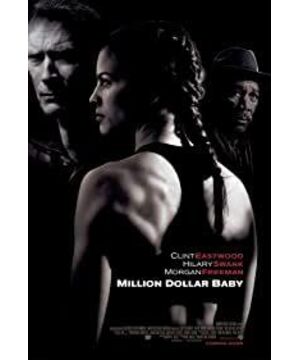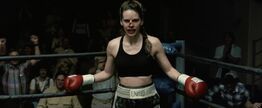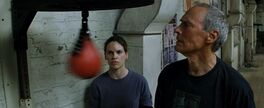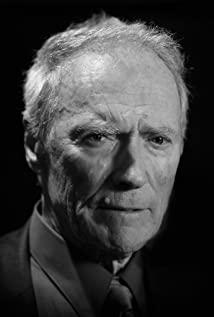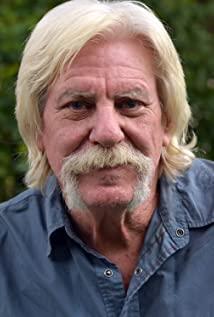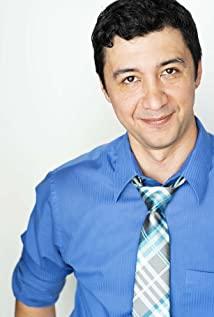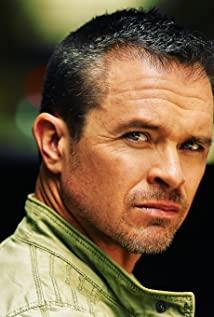"Million Dollar Baby" by Roger Ebert Clint Eastwood is a masterpiece, pure and simple, profound and true. It is a story about a poor girl who thinks she can be a boxer and an elderly boxing coach, with a good friend of the coach, a former boxer as the narration. But this is not a boxing movie, but a movie about boxers. The rest of the story, how deep it is, and what kind of emotional power it contains, I can't tell in this comment, because I don't want to mess up your experience of watching movies and follow this story into the deepest secrets of life and death. This is the best movie of 2004.
Eastwood played the coach Frankie. He opened a shabby boxing gym in Los Angeles and read poetry in his spare time.
Hilary Swank played Maggie, from southwest Missouri. She has been a waitress since she was 13 years old. She sees boxing as the only way to escape this life. Otherwise, she said: "I'd better go home and buy an old trailer. Frying Pan and Oreo..." Morgan Freeman played Scrap. He entered the championship game under Frankie's manager. Now he lives in a room in the boxing gym and has been Frankie's partner for decades. When Frankie rejected a female boxer, Scrap persuaded him to give Maggie a chance, "She only knows one thing when she grows up. She is a worthless person."
These three characters are shown clearly and truthfully. It is rare in other movies. Eastwood, just as he doesn’t have an ounce of fat in his thin body, there are no redundant words in his movies, even when the film deals with the deep emotions of the last few scenes. He didn’t use light emotions, but Treat these people as equals.
Some directors gradually lose their attention as they grow older, while others do the opposite. Learning how to tell a story contains everything, nothing else. "Million Dollar Baby" is the 25th film directed by Eastwood and his best. Of course, "Mystic River" is a great movie, but this movie has found a simple and direct classic narrative method. This kind of movie will make you deeply immersed in the life you care about very much, when you sit quietly in the cinema watching it.
Morgan Freeman is the teller of the story, just like what he did in "The Shawshank's Redemption", the person depicted in Freeman's character is the object of his lifelong learning. The voice is steady and solid. You won’t find Scrap has any subjective influence or suggestion in his speech. He just wants to tell us what happened: how the girl entered the boxing gym, how did not want to leave, and finally why Frankie agreed to train her, and What happened after that. But Scrap is not just a bystander, the film also tells his own life when other people are not on the screen. This is a movie about the three of them.
Hilary Swank's role as Maggie is amazing. .Every note is real, she simplifies Maggie completely. Take the scene where she and Scrap were sitting at the counter eating lunch as an example. Scrap told her how she lost sight of one eye. Frankie blamed herself for failing to throw the towel (the boxer surrendered). This is an important scene of Freeman, but I want you to observe how Swank asks Maggie to do: nothing but listening, no "reaction", no lightly nodding, no body language except being completely still, only total Concern and resolute gaze.
There is another scene, the night after Frankie and Maggie visit Maggie's home and drive home. This visit did not go well, Maggie's mother (played by Margo Martindale) is a foolish and selfish monster. "I have no one but you, Frankie," Maggie said. This is true. Just don't get any romantic elements between them. This
is different from love and deeper than love. In addition, she told Frankie the story of her beloved father and her favorite dog.
Take a look at the way the photographer Tom Stern lights up in this scene, instead of using the usual "dashboard lights" method to mysteriously illuminate the entire front row of the car, observe how he makes the actor's face fade in and out in the shadows. Sometimes we They can't even be seen at all but can only be heard, observing how the rhythm of the light matches the tone and rhythm of the dialogue, as if the vision is caressing and talking.
Overall this is a dark movie. There are many shadows and night scenes, and the characters seem to be in a private destiny. This can also be said to be a "boxing movie" when it comes to scenes that tell about Maggie's boxing career and her several boxing matches. She won from the beginning, but this is not the point. "Million Dollar Baby" is about a woman who decides to do something for herself, and a man doesn't want to do anything for this woman at first, but does everything in the end.
The screenwriter of this film is Paul Haggis, who spends most of his time in the television industry, but this film will win him an Oscar nomination. Other possible Oscar nominations will be Swank, Eastwood, Freeman, best picture and some technical awards, and possibly the original soundtrack made by Eastwood himself. The soundtrack of this film has always played a necessary role without distracting the audience.
Haggis adapted a story from Rope Burns: a book "Stories From the Corner" written in 2000 by a boxing manager in his 70s, Jerry Boyd. The dialogue is poetic and not complicated. "How heavy is she?" Maggie asked Frankie's daughter, whom Frankie hadn't seen for many years. "Our family's troubles are measured by pounds." When Frankie saw Scrap's feet on the desk, "Where are your shoes?" Scrap: " I’m giving my feet a ride.” The conversation about the feet lasted for almost a minute, showing the film’s patience in portraying the characters.
Eastwood pays attention to supporting roles, which makes the world in the film look more real. The most unexpected is a Catholic priest. He is a good person. Recent films always seem to have some negative priest roles. Frankie goes to Mass every morning and prays every night. Father Horvak (played by Brian F. O'Byrne) told him that anyone who keeps mass every day for 23 years often suffers a deep sense of guilt. Frankie asked him for help at this critical moment. At this time, the priest did not respond with orthodox religious rhetoric, but told him cautiously: "If you do this now, you will lose yourself, even so deep that you will find it forever. Don't return to yourself." Listen, and when the screenwriter Haggis asked Maggie to use "frozen", a word that an ignorant country girl might say, but it's also a perfect word that can express what a thousand words can't express.
Movies nowadays are often composed of special effects and emotions. But this film consists of only three people: how do their actions stem from who they are, why they do it, and nothing else, but isn't this also the whole thing?
Dormant's note: Because I really like this film, I translated a review of my favorite film critic when I was free.
View more about Million Dollar Baby reviews


